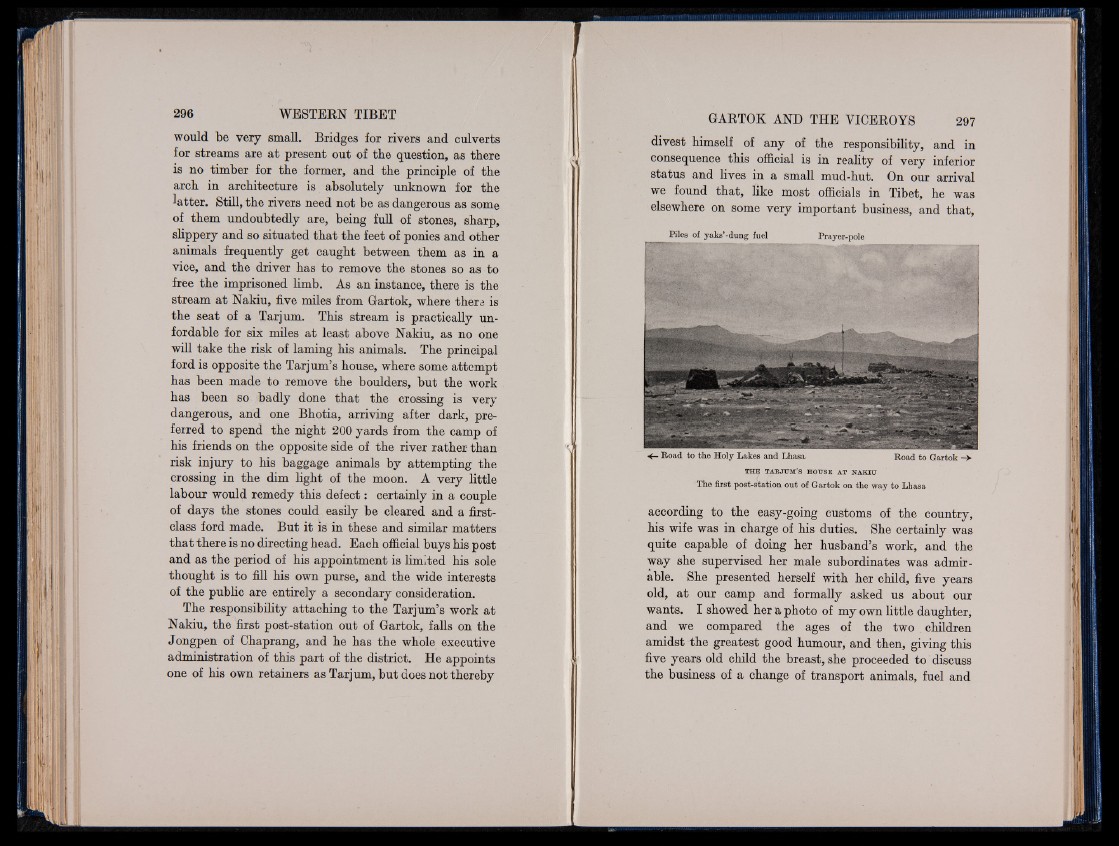
would be very small. Bridges for rivers and culverts
for streams are at present out of the question, as there
is no timber for the former, and the principle of the
arch in architecture is absolutely unknown for the
latter. Still, the rivers need not be as dangerous as some
of them undoubtedly are, being full of stones, sharp,
slippery and so situated that the feet of ponies and other
animals frequently get caught between them as in a
vice, and the driver has to remove the stones so as to
free the imprisoned limb. As an instance, there is the
stream at Nakiu, five miles from Gartok, where there is
the seat of a Tarjum. This stream is practically un-
fordable for six miles at least above Nakiu, as no one
will take the risk of laming his animals. The principal
ford is opposite the Tarjum’s house, where some attempt
has been made to remove the boulders, but the work
has been so badly done that the crossing is very
dangerous, and one Bhotia, arriving after dark, preferred
to spend the night 200 yards from the camp of
his friends on the opposite side of the river rather than
risk injury to his baggage animals by attempting the
crossing in the dim light of the moon. A very little
labour would remedy this defect: certainly in a couple
of days the stones could easily be cleared and a first-
class ford made. But it is in these and similar matters
that there is no directing head. Each official buys his post
and as the period of his appointment is limited his sole
thought is to fill his own purse, and the wide interests
of the public are entirely a secondary consideration.
The responsibility attaching to the Tarjum’s work at
Nakiu, the first post-station out of Gartok, falls on the
Jongpen of Chaprang, and he has the whole executive
administration of this part of the district. He appoints
one of his own retainers as Tarjum, but does not thereby
divest himself of any of the responsibility, and in
consequence this official is in reality of very inferior
status and lives in a small mud-hut. On our arrival
we found that, like most officials in Tibet, he was
elsewhere on some very important business, and that,
Piles of yaks’-dung fuel Prayer-pole
< - Road to the Holy Lakes and Lhasa Road to Gartok
THE TARJUM’S HOUSE AT NAKIU
The first post-station out of Gartok on the way to Lhasa
according to the easy-going customs of the country,
his wife was in charge of his duties. She certainly was
quite capable of doing her husband’s work, and the
way she supervised her male subordinates was admirable.
She presented herself with her child, five years
old, at our camp and formally asked us about our
wants. I showed her a photo of my own little daughter,
and we compared the ages of the two chüdren
amidst the greatest good humour, and then, giving this
five years old child the breast, she proceeded to discuss
the business of a change of transport animals, fuel and